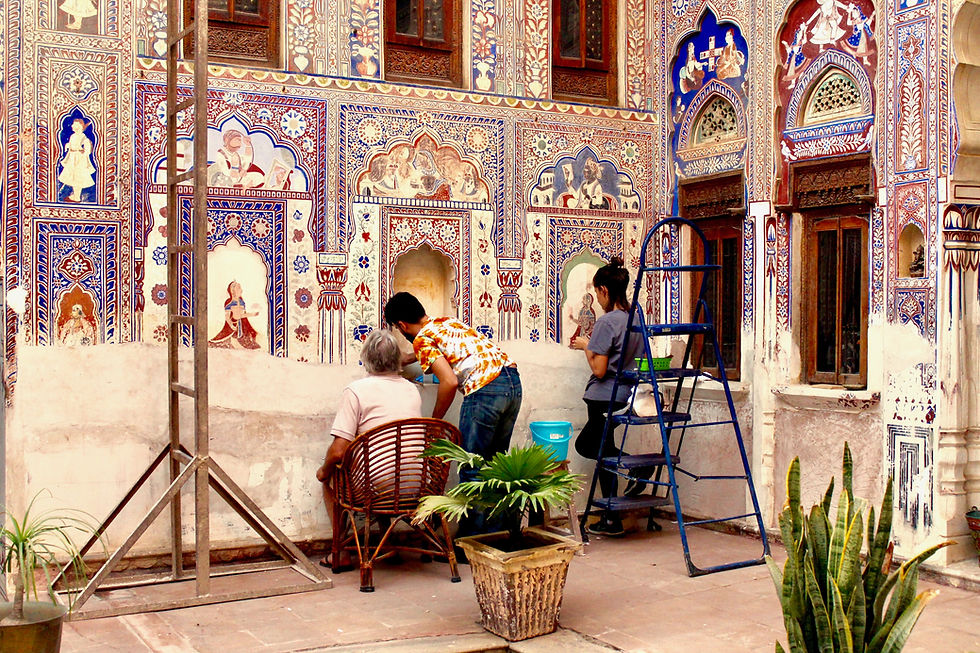WORKSHOP #3
- theshekhawatiproject
- Feb 1, 2019
- 3 min read
A training workshop is a space for exchange and transmission of know-how between international restoration specialists, local and international university students, and local artisans. It is also a place for dialogue and sharing with the local population who, when they rediscover their heritage, become involved in the preservation of their living and urban environment.
Un chantier-école est un espace d’échange et de transmission des savoirs-faire (savoir-faire) entre spécialistes internationaux de la restauration, étudiants d’universités locales et internationales et artisans locaux. Il est aussi un lieu de dialogue et de partage avec les populations locales qui, redécouvrant leur patrimoine, s’engagent dans la préservation de leur milieu de vie et environnement urbain.

This year the training workshop is setting up its scaffolding on the south facade of Le Prince Haveli. The aim is to apply a protocol encompassing techniques of cleaning, consolidation and retouching of the frescoes, resulting from the research and tests carried out by the previous workshop.
It is being supervised in February by Antony Pontabry, a Franco-American specialist in fresco restoration (his third participation), and in March by Sabine Cotte, a Franco-Australian restorer who has worked extensively in northern India and Nepal (her first participation).
We have 2 Australian restoration students taking part, Peter and Lily, and an Indian student, Khushboo, who is also a freelance architect based in Delhi.
Harpreet Tanday, an Italo-Indian PHD student, is here for the second time. She is in charge of a project of research into the nature of the pigments and binders used in the Shekhawati frescoes, and also into their impairment. This time she is acting as restoration assistant to the professionals.
The team has welcomed the addition of Radiasham, a Fatehpur mason, and his assistant Tofik. With their help we are perfecting the application of arayish, a rare and very refined stucco, which is the base for the fresco lustro technique specific to Rajasthan.
In addition to exploring the preservation techniques particular to the region, each workshop is also the opportunity for all the participants to discover the innumerable treasures (havelis, chhatris, baoris) in which the region abounds, and to take stock of the alarming rate of dilapidation of the painted architectural heritage of Shekhawati.
Breathing new life into an outstanding ecosystem and cultural heritage - this is one of our ambitions!
Cette année, le chantier-école installe ses échafaudages à Fatehpur, sur la façade sud de la haveli Le Prince. Il a pour objectif l’application d'un protocole englobant techniques de nettoyage, de consolidation et de retouche des fresques,résultant des recherches et tests du précédent workshop.
Il est encadré en février par Anthony Pontabry, restaurateur franco-américain spécialiste de la fresque (3ème participation) et en mars par Sabine Cotte, restauratrice franco-australienne intervenant dans le nord de l'Inde et au Népal (1ère participation).
Il accueille 2 étudiants en restauration australiens, Peter et Lily, et une étudiante indienne, Khushboo, également architecte free-lance basée à Delhi.
Ce sera une seconde participation pour Harpreet Tanday, doctorante italo-indienne, en charge d’un projet de recherche sur la nature des pigments et liants utilisés dans les fresques du Shekhawati ainsi que leur altération et intervenant, cette fois-ci, en tant qu’assistante de restauration auprès des professeurs.
L’équipe s’est enrichie de Radiasham, maçon de Fatehpur et de son assistant Tofik. À leurs côtés, nous perfectionnons l'application de l’araiysh, un stuc rare et raffiné, qui sert de support pour la technique de fresco lustro très spécifique du Rajasthan.
En plus d’explorer les techniques de préservation spécifiques de la région, chaque chantier est aussi l’occasion, pour tous les participants, de découvrir d’ innombrables trésors (havelis, chhatris, baoris) et de faire le constat de l’alarmant état de délabrement du patrimoine architectural peint du Shekhawati.
Redonner vie à un écosystème et à un patrimoine culturel hors du commun, voilà l’une de nos ambitions !














































Comments